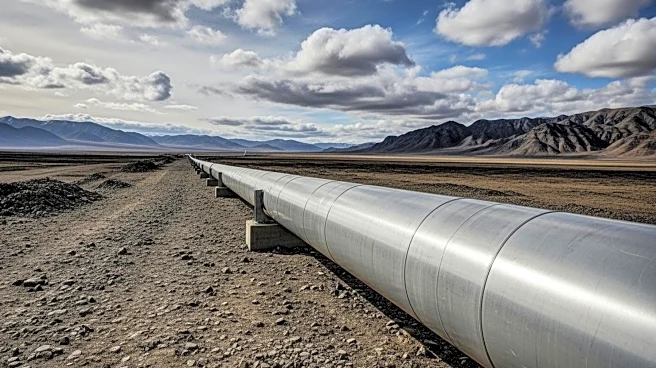What's Happening?
The recent agreement between China and Russia to finalize the Power of Siberia 2 gas pipeline marks a significant setback for President Trump's Eurasian strategy. This pipeline deal, which will nearly double Russia's gas exports to China, highlights a shift in geopolitical alliances. President Trump's strategy aimed to prevent Russia from becoming overly dependent on China by fostering a resource-centric partnership with Russia post-Ukraine conflict. However, the inability to secure concessions from Ukraine and concerns over NATO's potential involvement have pushed Russia closer to China. This development is compounded by a Sino-Indian rapprochement, partly catalyzed by Trump's tariffs on India, which has eased tensions between China and India, allowing Russia to proceed with the pipeline deal without fear of alienating India.
Why It's Important?
The China-Russia pipeline deal signifies a failure in President Trump's foreign policy, particularly in Eurasia. The deal not only strengthens the energy ties between China and Russia but also accelerates the shift towards a multipolar world, challenging U.S. unipolar interests. The alignment of Russia with China, and the improved Sino-Indian relations, reduce the leverage the U.S. might have had in the region. This development could lead to a realignment of global power structures, with BRICS and the Shanghai Cooperation Organization gaining more influence. The U.S. stands to lose strategic ground in Eurasia, as its efforts to divide and rule through strategic partnerships appear to have backfired.
What's Next?
The U.S. may need to reassess its foreign policy approach in Eurasia in light of the China-Russia pipeline deal. Potential responses could include diplomatic efforts to re-engage with India and Russia or to strengthen alliances with other regional players. The U.S. might also explore new economic or security partnerships to counterbalance the growing influence of China and Russia. The evolving geopolitical landscape will require careful navigation to protect U.S. interests and maintain its influence in the region.
Beyond the Headlines
The pipeline deal could have long-term implications for global energy markets, potentially shifting the balance of power in energy exports from Europe to Asia. It also raises questions about the effectiveness of U.S. sanctions and tariffs as tools of foreign policy, as these measures may have unintended consequences, such as driving traditional allies closer to U.S. rivals. The deal underscores the importance of understanding the interconnectedness of global geopolitical and economic strategies.









